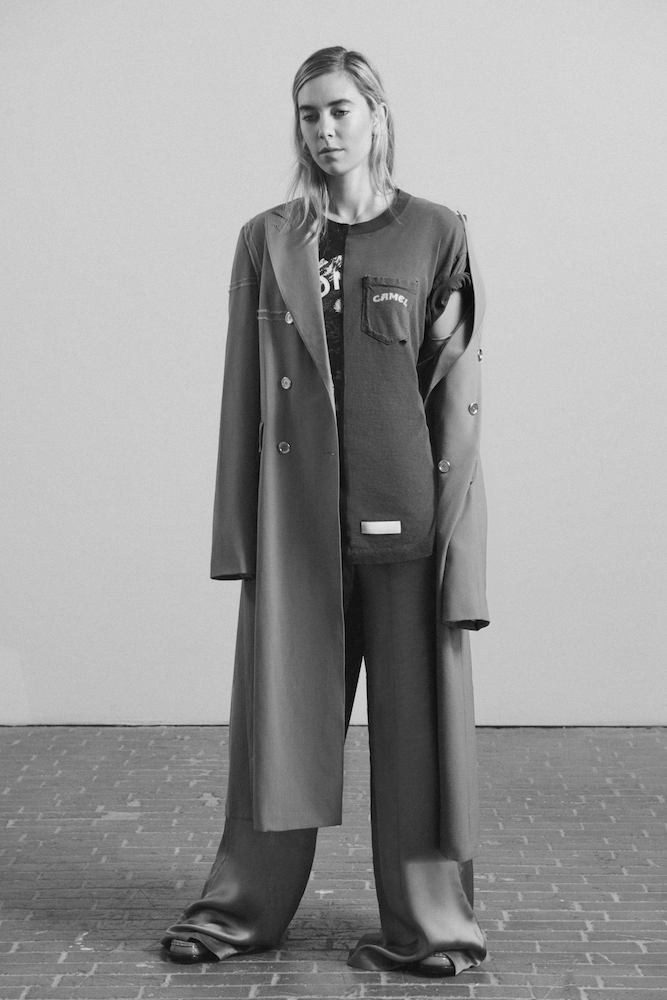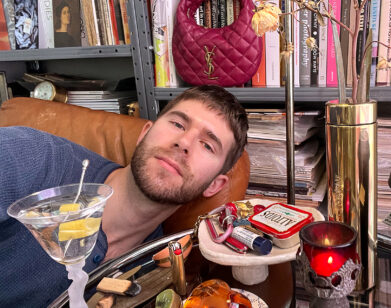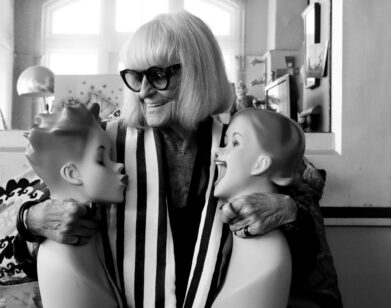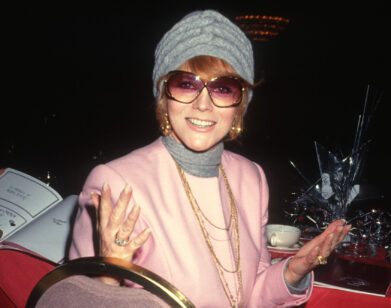Discovery: Vanessa Kirby
VANESSA KIRBY IN NEW YORK, APRIL 2016. PHOTOS: HANS NEUMANN. STYLING: BRITT McCAMEY/HONEY ARTISTS. HAIR: DAVID COLVIN. MAKEUP: CEDRIC JOLIVET/SEE MANAGEMENT USING MAC COSMETICS.
“Stella is the battleground between Blanche and Stanley,” says British actress Vanessa Kirby of her character in A Streetcar Named Desire. “You’ve got these two cyclones, these forces of nature, and she’s in the middle of them,” she continues. “The play is Stella’s choice.”
Directed by Benedict Andrews, this particular production of Tennessee Williams’ tragedy stars Gillian Anderson as Blanche, Stella’s sister and the protagonist of the play, and Ben Foster as Stella’s husband Stanley Kowalski. It was Andrews and Anderson who first decided to collaborate on the show and subsequently brought the idea to the Young Vic in London. Garnering rave reviews, Streetcar debuted in London over the summer of 2014. Now, after a near two-year hiatus, the principal cast and crew are back for another electrifying run, this time at the newly-renovated St. Ann’s Warehouse in Brooklyn.
Twenty years Anderson’s junior and a good four inches taller, Kirby was never a shoe-in for the part of Blanche’s sister. The 28-year-old Londoner had worked with both Anderson and Andrews before—she played Estella to Anderson’s Miss Havisham in a 2011 television adaptation of Great Expectations and starred as Masha in an Andrews-directed production of Three Sisters—and had even introduced the two, but nothing was guaranteed. “I said to Gillian, ‘If only I could be your Stella,’ and she said, ‘If you can shrink and age in the next year, then you should be,'” she recalls. “When my agent called me and said, “Hello, Stella!” I nearly died. I think I was up a mountain filming Everest at the time, but we decided it would work somehow.”
In between A Streetcar Named Desire‘s two runs, Kirby kept herself busy with films like Me Before You and Genius; miniseries such as The Crown, The Dresser, and The Frankenstein Chronicles; and a stage production of Uncle Vanya. Returning to Stella, she says, has been a little “weird.”
AGE: 27
HOMETOWN: Southwest London
INTRO TO ACTING: It was simply what made me happiest—whether in school or outside of school—and it was where I felt most accepted. I didn’t understand how it would ever manifest into anything. My parents took me to plays all the time, and I remember being really bored when I was a kid. Then when I was watching The Cherry Orchard, I totally believed [the actors]—I believed they were a family and I felt so heartbroken that they lost the house. I remember I left and turned to my dad and said, “I’m going to be here one day.” He was like, “Yeah, yeah.” So that was a pivotal moment. There were lots of other ones, and I never dreamed it would become a reality.
AN EDUCATION: I did apply for drama school when I was 17 and I didn’t get in; I had a really bad audition. So I went traveling for a year and was going to apply to drama school, but since I’d been traveling, I realized how much I’d changed during that year and how many people I’d met. I went all over the world on my own, hitchhiked here and there and had no money and got into all kinds of weird situations. I came back from that year a different person and thought, “My god, how am I supposed to act being different people when I’ve only experienced a certain part of London for a certain part of my life?” I thought if I go to uni I can read and watch people and take many different subjects—take philosophy modules—and have time to travel in the summers, which I did. I thought, “I hope this will make me a better actor,” and it did. It was a bit of a leap of faith, but I felt so much more ready and I knew myself better, which I think is so important. It’s such and odd industry; it’s tough and you have to give it 100%. I don’t think I would’ve been ready when I was 18.
NEW PLAYS VS. CLASSICS: I did The Acid Test at the Royal Court, by Anya Reiss, who’s the most wonderful, amazing female writer. She was only 19 when she wrote it. She wrote it about three girls in a flat on a Friday night and that was magic, because it was so rare to have three girls in your age group in a play. It just doesn’t happen. You’re always one of the only girls, because there are so many male writers, and there are not enough good parts for women. That was with Phoebe Fox and Lydia Wilson, two of the greatest actors around. We had so much fun. I love new writing, I wish I could do, or had done, more of it, but I seem to be doing a lot of Chekhov.
SHRINKING AND AGING: Gillian came to Three Sisters and we had dinner afterwards. It was a really special production; Benedict is so clever and such a genius. He’s just magic. We sat together and I said, “You need to do a play!” And she said “I know, I know.” I said “I know what I think you should do,” and she said “I know what play I want to do,” and we both said “Streetcar” at the same time. A week later she emailed me and asked for Benedict’s contact details, so I put them in contact over email. I didn’t hear anything else, and then bumped into her and she said, “I think it might happen, we’re just looking for theaters.” I didn’t think anything of it. I had played Masha in Three Sisters and she was incredibly strong and aggressive, and I didn’t know if Benedict would want me to play Stella.
STREETCAR‘S ROTATING STAGE: Funny enough, Uncle Vanya had one too. You stop noticing it. At the beginning, it does make you feel really weird, because it’s really disorientating. Your sense of where the audience is and how you contact them as well as the other actors puts you out of it. Now I really don’t notice that it revolves at all, except when I get on it in one scene. It’s become our little home; it’s become Stella and Stanley’s little place. I don’t think about it anymore.
ONCE MORE FROM THE TOP: When we have to do two shows in a day—we haven’t done that yet this run, but tomorrow we have two—that is hardcore. By the end you just need a drink. Gillian and I look at each other and go, “My god, the thought of having to start from the beginning, at the very top, saying hello to each other again, it’s just insane…” I’ll try to have a little nap in the afternoon and generally try to get as much sleep as possible, but it’s not easy. It goes around in your head so much it’s hard to relax.
REDISCOVERING STELLA: I literally just finished production of Uncle Vanya a week before we started this, and [my character in Uncle Vanya] Yelena is such a different person [to Stella]. It took a bit of adjustment to remember who Stella was. We came back with new ideas, and you realize that they might be based on what you want to do with it rather than who Stella actually is. We got to go deeper with things. It was really amazing to do that. I felt so lucky to have had that life in between; you come back as a different person, more grown up than when I first did the show.
STELLA AND STANLEY: Ben [Foster] and I have definitely deepened that relationship, which is really nice. [Now] Stella is more of a mediator; before she’d get angry quicker, which I liked because I wanted her to stand up for herself, but in the writing, she’s the master avoider of facing reality. Blanche is exactly the same, just in a different way. She doesn’t want to look at the painful things, so she just looks away and pretends it’s not happening. In the play, I feel like Blanche’s whole journey is waking up from denial. In the beginning when Blanche is learning all this stuff she has to run away and lock herself in a bathroom because she can’t face it. In a way, Blanche has faced reality more than Stella has. Stella’s run away to New Orleans and buried herself in her toxic, amazing relationship with a man that is definitely a love and sex addiction, and has buried her head in the sand. Only right at the end of the play, when Blanche is walking off, does she realize she hasn’t got any family left.
It’s easy to look at Stella and Stanley’s relationship as he hits her and is abusive and the sex is so much a central part of it, but finding the love has been so important. That took us a while. I don’t know how it reads at all from the outside, but from the inside it’s more and more fun when you find the believability of those two people. She’s come from such a different world, he represents this new danger and she gets a thrill from it.
THE RAPE SCENE: From Stella’s point of view, she literally says, “I couldn’t believe her story and go on living with Stanley,” she’s made the choice not to believe it. That’s the choice she makes at the end. I have to stick with that one, really.
THE AFTERMATH: We all had our ideas about what happens to Stella. At the end of the show, I always find it harder than Gillian. We all felt Blanche has this kind of transcendence—she transcends what Tennessee describes as this purgatory of the living dead in Elysian Fields. Blanche gets to leave, wherever she’s going, whatever that reality is for her, whereas Stella’s kind of stuck on those stairs. It’s quite hard to come to terms with, really.
After her sister leaves, that’s when Stella breaks really for the first time, when she actually sees the back of Blanche’s head walking off. It’s important that the audience thinks about what they would do, I think. Stella’s choice is their choice really. What do you do with a sister who’s mentally ill?
A STREETCAR NAMED DESIRE IS NOW ON AT ST ANN’S WAREHOUSE IN BROOKLYN.







